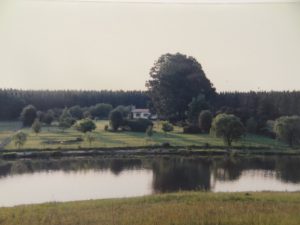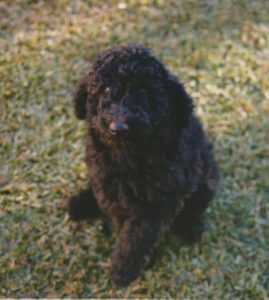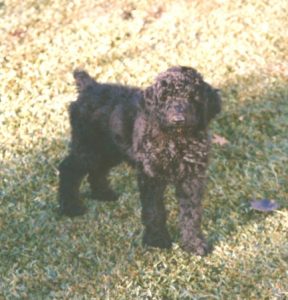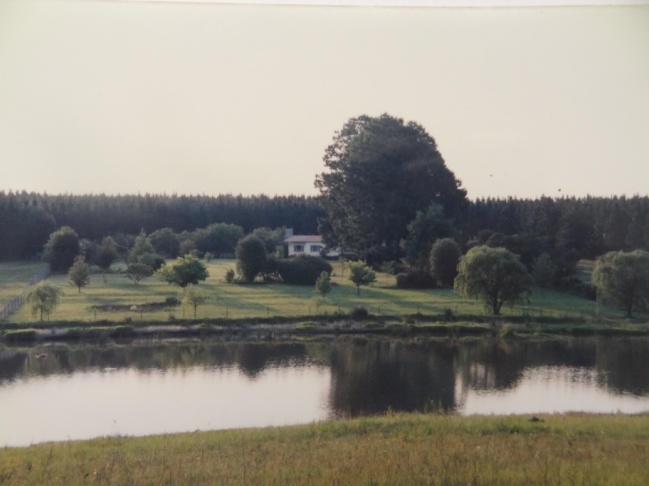THE CATALYST
Up until the year 2000, my family had been pretty much of the ordinary, garden variety.
You know what I mean…
Marriage… After four years a little boy… Followed two years later by a little girl.
At regular and orderly intervals some dogs and cats had put in an appearance and left their pawprints across the annals of our lives. Yes, they provided an assortment of mildly amusing (and some heartrending) anecdotes, but none of it had been life changing.
Until the turn of the century and the arrival of the new millennium which turned out to be the Year of the Dog.
But I am getting ahead of myself.
To explain what set it all off, I need to back up a bit.
The year is 1998.
It is July, slap bang in the middle of the South African winter and I am sitting, quite appalled, staring through the windscreen of our car at the bleak prospect before me – the surroundings of the factory, where my husband Barry is being interviewed for a prospective job. (Just in case you become indignant at this disregard for my comfort, let me assure you that I was invited to come into the office building, but I want to sit out in the warm sunshine – where I can also try to get a feel for the place. And so far, I might add, the feeling is not good.)
We have come from home which is on the South African Highveld.
Admittedly, you have to love the Highveld in order to admire the winter landscape, because to the undiscerning eye it seems to be a uniform brown. The grassy plains are sere – dried and withered by the severe frosts. The skies cannot by any stretch of the imagination be described as blue. They are a dusty grey.
But the discerning eye notes the subtle differences in the hues of various dried grasses, the softening of the stark landscape by groves of blue gums, which also help break the monotony of the rolling, treeless plains. And the spaces are wide, wide, wide… Open and free.
Just outside Ermelo, to the east, is the edge of the Highveld Plateau. The road winds through a valley and comes onto the southern part of the Great Escarpment, a watershed which separates rivers flowing east and west. About thirty kilometres or so before you reach Piet Retief is a tiny little settlement known as Iswepe.
We turn off the national road and cross a railway line. The dirt road bears witness to heavy traffic – deep depressions which clearly become pools of mud to be navigated during the rainy season.
We pass a general store (painted the vilest shade of yellow) and take another turn to the factory. The factory itself looks grubby and old – clearly, the wattle extract industry is not a clean one.
As I sit contemplating the surrounding countryside, which I can see between the factory buildings, I am not entranced by the view of straggly wattle and dust shrouded pine plantations.
Husband and prospective superior eventually emerge from the office building. They are smiling and looking as though they have got on like the proverbial house on fire.
Mmm…
We leave the factory to take a look at the house we will inhabit… if husband gets the job… and if he accepts it…
We pass a small prefab post office, a little wooden church and a clubhouse on the left. To the right lies the small residential village. Square, plain houses built for functional, not aesthetic, purposes. The surface of the road is no better than the one at the factory. It is rutted from the constant traffic of forestry trucks, bearing their weighty loads of pine trunks. Clouds of red dust rise behind us and drift onto the pine plantations. What it will be like in the rainy season I shudder to imagine.
One kilometre down the forestry road, we turn off to the right onto a track which skirts the pine plantation. To the left lies a small dam, still and brown and gleaming coldly in the winter sunshine.
We come to a house.

From the outside, this house, while not as unattractive as those in the village, is still not exactly a joy to behold. It faces east and must therefore be cold. It has exactly one north-facing room – a large sunroom tiled with crazy paving. I do not like crazy paving. Especially inside a house. The rooms are fairly spacious, but only some are carpeted and the carpeting is dilapidated. The paintwork is dingy and all inside doors, including cupboards, are painted dark brown, leaving an impression of gloom.
I do not like this house. It is cold, dark and dismal.
The garden is large – I can just imagine the work – and it is winter-dead. Brown. Leafless.
Back home is a beautiful house which we have spent four years renovating and painting and decorating and turning into the home of our dreams. With a garden which is just beginning to show the results of loving attention.
As we leave this dump of a place – the word village is too picturesque to be apt – husband informs me that the job fits him like a glove. It is as though it was designed for him – his specific skills and his specific experience.
There is only one thing I can do. Silently.
Lord, please don’t let Barry get this job.
Not even two hours later (we are still driving home) Barry gets the phone call.
Well, thanks a bunch!
And so we (Barry, me and our daughter Natasha) moved, lock, stock and … well, not quite the whole barrel.
Barry started his new job in September while I remained behind, and for two fruitless months, tried to get the house sold. Then a brainwave! Why not let my retired parents come and live in our lovely home – to tend it and nurture it with love and care, should we ever decide to return to the Vaal Triangle? After all, we will eventually also be retiring.
Brilliant solution. Mom and Dad delighted.
And I did not have to say goodbye to the house where I had put down very deep roots.
While Iswepe and its immediate surrounds remained unappealing, my new home had undergone a transformation. Freshly painted (according to our specifications and with the inside doors now white) and newly carpeted, the house was now bright, light and very comfortable, with a lot of cupboard space. It remained a cold house, but with an open fire place in the lounge and a closed coal stove in the kitchen, together with an unlimited supply of free wood, we were very snug in winter. (A visit in winter to the bathroom and its cold toilet seat remained a challenge throughout the nine years we lived there, though!)
But the most magical transformation of all was the garden.
Every spring it literally blazed with glorious azaleas – magenta and pink and strawberry and apricot and white – blossoming under a grove of nine enormous pine trees and against the house. Along the fence on one side of the property, a huge wisteria crept along stretching tendrils up into the nearby trees. For a few weeks in early spring the blue-lilac cloud rivalled the azaleas. On the other side of this fence grew two shrubs with shiny dark green leaves and small white flowers which gave off a sweet and spicy fragrance, especially heady in the early morning. The diamond mesh of the wire fence was always woven with gossamer webs and in the early morning these sparkled with diamonds of dew.
Past the pine trees, the vast lawn stretched down to the dam. This was not your common garden, but rather a small country estate!
There was a gate at the bottom of the garden which gave us direct access to the dam and we eventually acquired a two-seater canoe, spending many pleasant hours paddling across the quiet waters.
When we first moved there we were almost completely surrounded by a pine plantation and could not be seen from the road. There were only two other houses on the dam, but they were far enough away from us not to spoil the illusion that we lived in solitary splendour in a forest clearing.
It was all quite magical.
 We came down to earth with a bump. It is at this point that I think I should introduce Purdey and Gambit, a pair of black standard French poodles who had been part of our family since they arrived as eight-week-old pups ten years before.
We came down to earth with a bump. It is at this point that I think I should introduce Purdey and Gambit, a pair of black standard French poodles who had been part of our family since they arrived as eight-week-old pups ten years before.
They now occupied the back part of the garden which was completely fenced off from the front. Access between the two parts was gained by two gates, one on either side of the house. Owing to the state of undeclared war which existed between the poodles and our cats (to be introduced and described later) the gates remained closed so that the said cats (now aged fourteen) could use the front garden in peace.
The poodles shared a large kennel which was placed on the back stoep just outside the kitchen door.
One Sunday morning, soon after the move, Barry and I left early to attend our first church service in Piet Retief.
Natasha had remained behind and was still in bed when she heard an unusual scratching sound. She got up and walked down the passage towards the kitchen, trying to figure out where the sound was coming from.
The house had a very peculiar plan.
The kitchen, lounge and dining room each led off from a square hallway. To the left of the door into the kitchen was a fancy glass panelled door, which was clearly meant to be the main entrance. It opened onto a small porch which led into the back yard! To the left of the porch were the back bedroom and bathroom windows. Round the corner to the right was the kitchen stoep with the aforementioned kennel.
A very strange position for the main entrance, I’m sure you will agree!
The porch was closed off with a very secure safety gate – so seldom used (like never!) that we battled to open it. (We used either the backdoor or the sunroom door to enter the house.)
As Natasha came into the hallway, it seemed to her that the scratching sound was coming from the porch. She unlocked the glass panelled door and opened it and before she could step outside onto the porch, a young man flashed past her peripheral vision as he made a dash for the back fence.
The sound of his frantic getaway roused Grandma and Grandpa poodle from their geriatric slumber and, forgetting their advanced years, they leapt from the kennel and chased after the young man with surprising speed and agility. Thoroughly incensed by the gall of this intruder, they made a most impressive effort to hunt him down, baying for his blood. (Let me just add here that Gambit had a deep Rottweilerish bark.) With one almighty leap, the prospective burglar cleared the fence and disappeared into the plantation, never to be seen again. The poodles, fully refreshed by the unexpected exercise, pranced back to the house, wearing smug and self-satisfied expressions.
The only evidence left behind was a rucksack containing an alarm clock and an expensive pair of binoculars, and the damaged putty around the unguarded central pane of the back bedroom window.
We had to face the fact that our isolation had some serious disadvantages.
We also had to face the fact that our elderly guardians were no longer to be relied upon. Yes, they chased him off with great success, but they had neither heard his approach nor had they reacted to the scratching, even though they were just around the corner.
And so we came to the momentous decision, the repercussions of which were to change our lives so dramatically.
We needed a dog with serious teeth – what else other than a Rottweiler! – and we needed a little yappy dog to keep the Rottweiler awake. (I would at last get the miniature dachshund I had long desired.)
The days of our dogs – or is that dogs of our lives? – was about to begin.




 We came down to earth with a bump. It is at this point that I think I should introduce Purdey and Gambit, a pair of black standard French poodles who had been part of our family since they arrived as eight-week-old pups ten years before.
We came down to earth with a bump. It is at this point that I think I should introduce Purdey and Gambit, a pair of black standard French poodles who had been part of our family since they arrived as eight-week-old pups ten years before.